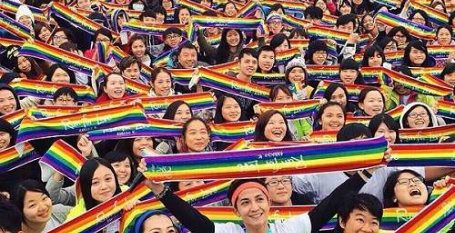About 3,500 people took part in a “rainbow run” in Taipei to show support for marriage equality and equality rights in Taiwan.
The Dec 13 event where people wore a rainbow scarf ran a 15 kilometer course run in Taipei was organized to highlight gender diversity, discrimination and equal rights, according to GayNZ.com.
“In the face of love, everyone is the same. Everyone longs to love and to be loved, so why should that differentiate between genders?” said skincare company Abrazo K, the event’s organizers, in a statement.
In October about 70,000 LGBT members and their friends and supporters took the opportunity of the annual gay Pride Parade in Taipei to demonstrate for equality laws in one of Asia’s most respectful of countries toward sexual diversity.
Gay and lesbian groups in Taiwan, one of Asia’s more liberal societies, have for long been urging the government to legalize same-sex marriage. However, conservative forces have been lobbying hard to thwart a bill in parliament asking for equal rights.
Marriage between same-sex couples is not legally recognized in Taiwan, although 3.5 to 5 percent or at least 1.2 million of the 23.4 million people in Taiwan identify themselves as lesbian, gay, bisexual or transgender.
A draft bill that would legalize same-sex marriage cleared a first reading in the Legislative Yuan last year and was sent to the legislature’s Judiciary and Organic Laws and Statutes Committee for review.
Since then, the bill’s progress has stalled, largely due to religious opposition as seen in last year’s rally against revising Article 972 of the Civil Code to change the term “man and woman” to “two parties” in the article concerning marriage and the term “father and mother” to “parents” in the Civil Code.
Nonetheless, Taiwan is already has one of the most equality minded societies with regards to the gay community in the Asia-Pacific region.
Taipei the capital is dotted with shrines to Tu Er Shen, the Taoist god of gay men, and the government’s attitude towards same-sex marriage has made greater gains than in Japan, China, or even Australia.

